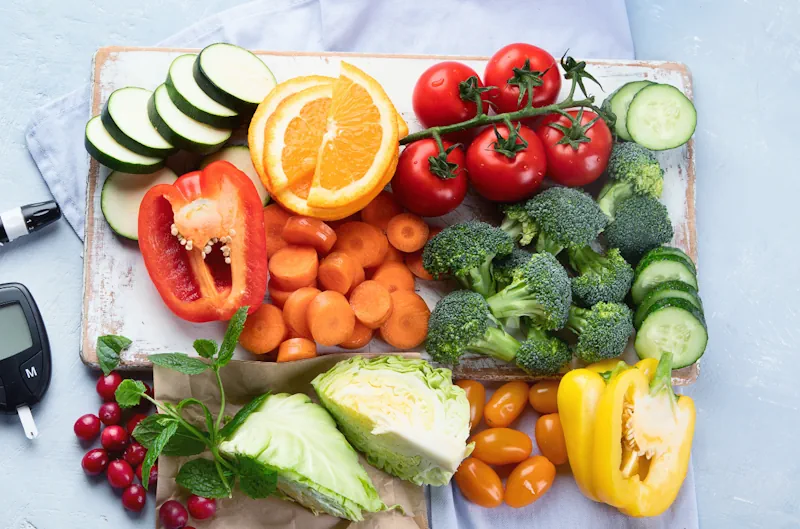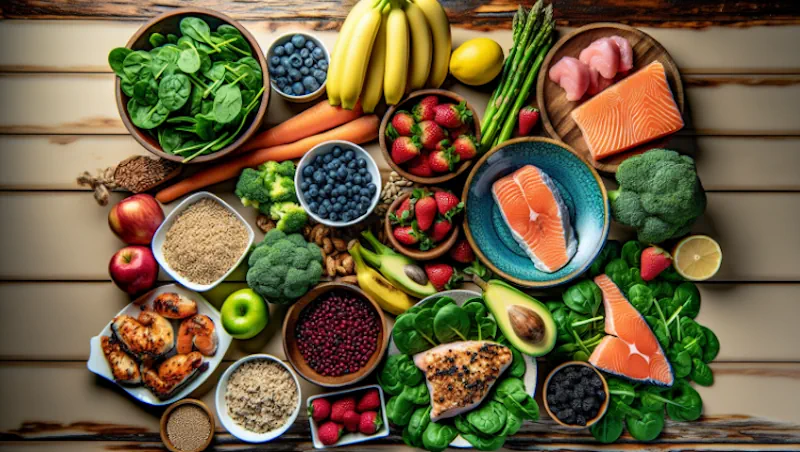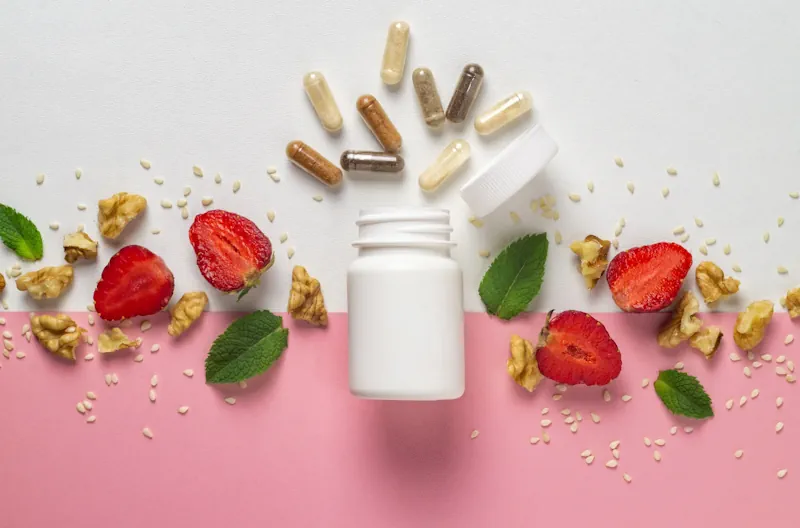Top 10 Essential Micronutrients for Strength and Where to Find Them

What's In This Article
- Key Takeaways
- The Power of Micronutrients for Strength
- Top Micronutrients for Strength
- Dietary Sources of Micronutrients
- Supplementation Considerations
- Summary
- Frequently Asked Questions
When searching for ‘micronutrients for strength’, you want to identify the key players that bolster muscle performance and energy levels. This article cuts through the confusion to outline essential micronutrients, elucidates why your body needs them, and suggests dietary sources to keep you at the top of your game. Whether you’re an athlete or just striving for better fitness, this information is your starting block for improved strength and endurance.
Key Takeaways
- Micronutrients are crucial for athletes’ performance, supporting energy metabolism, muscle growth, and recovery. Athletes' requirements for micronutrients are potentially higher than those of the general population.
- Important micronutrients for strength include Vitamin D, Iron, Magnesium, Zinc, Calcium, Vitamin C, Vitamin E, Potassium, Selenium, and Vitamin K, each supporting different aspects of physical performance.
- Athletes should aim to obtain micronutrients through a balanced diet rich in fruits, vegetables, whole grains, and lean proteins; supplementation may be needed in cases of insufficient dietary intake, but it requires professional consultation.

The Power of Micronutrients for Strength
Within sports nutrition, there’s a growing acknowledgement of micronutrients' key role in boosting athletic performance. These tiny nutrients are foundational for preventing health declines, especially in athletes. When it comes to body functions like energy production and muscle recovery, micronutrients take center stage. An athlete’s competitive edge can be amplified with adequate levels of micronutrients, optimizing the potential of their training. Micronutrients enable vital physiological functions related to performance, such as energy extraction from macronutrients and oxygen delivery.
Given athletes' high energy expenditure, they often need an increased intake of both macronutrients and micronutrients to enhance their performance. The optimal intake of vitamins and minerals for athletes can sometimes be a subject of debate, suggesting that some athletes might need higher amounts of specific micronutrients. But what micronutrients play a crucial role in muscle growth and energy metabolism? Let’s find out.
The Role of Micronutrients in Muscle Growth
Vital for athletes, micronutrients such as vitamin A, zinc, and vitamin K significantly contribute to muscle health and recovery promotion. Vitamin A's protective role against cell damage aids in lowering aches and fatigue, thus improving response time and muscle recovery. On the other hand, Zinc contributes to recovery from workouts by helping reduce inflammation markers.
Vitamin K is essential for synthesising proteins involved in blood clotting and bone health, crucial for athletes to maintain strength and prevent injuries. An athlete with a vitamin K deficiency may have an increased risk for bone-related issues such as osteoporosis and osteoarthritis, underlining the need for adequate intake for bone remodeling and overall strength.
Micronutrients and Energy Metabolism
Energy metabolism is the process of generating energy (in the form of ATP) from nutrients. Micronutrients like magnesium, potassium, zinc, vitamin B12, and selenium play a significant role in this process. Magnesium is integral to energy metabolism, involving over 300 enzymatic processes, maintaining muscle function, and key metabolic rates, which sustain physical performance. Hormone and metabolic research further emphasizes the importance of these micronutrients in maintaining optimal health.
Potassium and zinc aid in energy production; potassium optimizes carbohydrate metabolism and minimizes muscle fatigue, while zinc enhances aerobic capacity and supports muscle protein synthesis. Vitamin B12 is essential for protein and fat metabolism, red blood cell production. Selenium contributes to muscle during exercise and the regeneration of vitamins for cellular repair.

Top Micronutrients for Strength
Essential micronutrients for strength include:
- Vitamin D
- Iron
- Magnesium
- Zinc
- Calcium
- Vitamin C
- Vitamin E
- Potassium
- Selenium
- Vitamin K
Each of these micronutrients supports various aspects of physical performance. Athletes in endurance or indoor sports may require specific micronutrients like iron and vitamin D to enhance their performance.
We’ll explore each micronutrient in more detail to understand their distinct contributions to strength and performance.
Vitamin D
Often known as the ‘sunshine vitamin’, Vitamin D is crucial for muscle function, contributing to protein synthesis, ATP production, and enhanced athletic performance, such as improved jump height and exercise capacity. It is also essential for bone health, supporting calcium absorption and impacting overall strength and skeletal integrity. A vitamin d deficiency can negatively affect these aspects of health, making vitamin d supplementation a potential solution for those lacking adequate sun exposure or dietary intake.
Adequate vitamin D levels contribute to a healthy vitamin D status and are strongly linked to healthy testosterone levels, which are important for building muscle mass. Vitamin D’s influence on muscle function and bone health significantly improves overall strength and physical endurance.
Iron
Iron, vital for delivering oxygen to muscles, directly influences muscular function and exercise performance, ultimately impacting athletes' physical performance.
Additionally, iron is necessary for energy production within mitochondria, fueling athletes during exercise and aiding in recovery.
Magnesium
Magnesium also stands as a crucial micronutrient for athletes. It provides several benefits, including:
- Improving energy levels
- Reducing fatigue
- Increasing muscle performance
- Enhancing sleep quality
- Improving stress management
- Boosting cardiovascular capacity
- Increasing power production
- Improving gait speed
These benefits make magnesium an essential nutrient for athletes.
Magnesium is involved in over 300 metabolic reactions crucial for maintaining normal nerve and muscle function, vital for peak athletic performance. Magnesium’s significance is underscored by its abundance in the body as the second most abundant intracellular divalent cation.
Regarding athlete-focused magnesium supplementation, forms like magnesium citrate or glycinate should be prioritized for better absorption and effectiveness.
Zinc
Zinc is critical for prime immune function, muscle recovery, and regulating several hormones in the body, thus enhancing overall strength and well-being. The daily zinc requirement is 11 mg for men and 8 mg for women.
Zinc supports immune function by contributing to the development and function of immune cells. It also aids muscle recovery by regulating muscle repair and growth. Hormone regulation, another key function of zinc, includes modulating testosterone levels, which has implications for muscle growth and reproductive health.
Calcium
Calcium is required for every muscle contraction, including the heartbeat. In addition to muscle function, calcium also plays a significant role in building bone strength, which is essential for overall strength and support during physical activity.
Calcium contributes to weight management by potentially increasing fat excretion and maintaining hormone balance. However, while calcium’s roles in the body suggest potential performance enhancements, there is no evidence that calcium supplementation directly improves athletic performance.
Vitamin C
Vitamin C enhances the immune system in several ways:
- It enhances the differentiation and proliferation of both B and T lymphocytes
- It increases antibody levels
- It modulates cytokine production
- It plays a role in histamine breakdown
All of these functions work together to fortify the immune system.
As an antioxidant, Vitamin C helps maintain cell health, a vital aspect in ensuring a reliable energy supply for workouts, consequently aiding fatigue reduction. Vitamin C is a co-factor necessary for the production of collagen by hydroxylating the amino acids prolyl and lysyl in collagen’s helix, thereby boosting energy levels, protecting the body from illness and injury, and being a crucial element in the healing of wounds.
Vitamin E
Vitamin E is essential for athletes as it protects the body, improves performance, and aids in recovery. Endurance is reduced in vitamin E deficiency, demonstrating the vitamin’s significance in athletic performance. Vitamin E possesses antioxidant properties that enhance aerobic power, a particularly noticeable benefit at higher altitudes.
Supplementing vitamin E beyond the recommended daily intake may help reduce muscle damage indicators post-exercise. Intense training athletes, especially those at altitude, may benefit from vitamin E supplementation above the standard recommendations. The recommended daily vitamin E intake is 15 mg/day to maintain adequate health levels.
Potassium
Potassium is key to sustaining fluid and electrolyte balance, crucial for overall hydration and bodily functions. Its role in electrolyte balance facilitates the maintenance of energy levels across the body’s cells.
Potassium aids in the reduction of lactic acid, contributing to recovery and reducing the likelihood of muscle cramps after exercise. Regular potassium intake can help prevent muscle cramps, aiding muscle recovery and function.
Selenium
Selenium, acting as a potent antioxidant, reduces cell damage from oxidative stress linked to exercise. Maintaining healthy selenium levels may be conducive to sustaining healthy testosterone levels, beneficial for athletic performance.
Adequate selenium intake is important for muscle recovery as it reduces the damage to muscle tissue resulting from exercise. A selenium deficiency can lead to extreme fatigue, underscoring its importance in recovery processes.
Vitamin K
Vitamin K facilitates bone strength, providing support for a solid physical framework. This essential micronutrient also reduces arterial stiffness, crucial for maintaining healthy blood flow and preventing cardiovascular diseases, including those related to blood pressure.
Adequate vitamin K levels are associated with improvements in heart health, which can potentially enhance the fitness levels of healthy athletes. To improve the body’s absorption of vitamin K, it should be consumed with a dietary source of fat.

Dietary Sources of Micronutrients
Maintaining a balanced diet is vital to attain the required levels of micronutrients for athletes. A diet rich in:
- fruits
- vegetables
- whole grains
- lean proteins
A well-balanced diet can provide the necessary vitamins and minerals for strength, overall health, and maintaining an ideal body composition.
However, the optimal intake levels of micronutrients can sometimes be debated, suggesting that some athletes might need higher amounts of specific micronutrients. A multivitamin supplement may be considered if dietary sources are insufficient to meet an athlete’s micronutrient needs.
Vitamin D
Vitamin D can be obtained from various dietary sources. Meat, including seafood and eggs, contains a natural source of vitamin D, serving as a critical dietary option for those with limited sun exposure. Foods such as eggs and salmon are animal-based sources of Vitamin D, although they offer the nutrient in smaller amounts compared to sun-derived Vitamin D.
For individuals following a vegan diet or those who prefer plant-based products, fortified foods like orange juice, plant milk, and cereals are recommended sources of Vitamin D.
Iron
Iron is a crucial micronutrient involved in oxygen transport and energy production. Maintaining adequate levels is essential for strength and overall health. Liver and red meat are among the richest animal-based sources of iron, offering a highly bioavailable form of this micronutrient.
Beans, including red kidney beans, edamame, chickpeas, and nuts, provide plant-based options rich in iron suitable for vegetarian diets. Fortified cereals and soybean flour enhance dietary iron intake and are especially beneficial in diets lacking in meat and other traditional iron sources.
Magnesium
Good sources of magnesium include green leafy vegetables, legumes, nuts, seeds, and whole grains. Foods particularly rich in magnesium comprise pumpkin seeds, chia seeds, almonds, spinach, cashews, peanuts, and black beans.
Dietary fiber-containing foods generally provide magnesium, and this essential micronutrient is also added to some breakfast cereals and other fortified foods.
Zinc
Some good food sources of zinc include:
- Shellfish
- Meat
- Nuts
- Beans
- Eggs
- Legumes
- Whole grains
These foods are especially beneficial for those with dietary restrictions.
Calcium
Dairy products are a primary source of calcium, fundamental for bone health and muscle function. Plant-based milk, such as soya drinks, when fortified with calcium, can be excellent alternatives to dairy for those seeking non-dairy options.
Calcium can also be sourced from fish, such as sardines and pilchards, where the bones are consumed, and from bread and products made with fortified flour.
Vitamin C
Citrus fruits like oranges are renowned for being rich in vitamin C. Strawberries and blackcurrants are other fruits that provide a healthy dose of vitamin C.
Broccoli and brussels sprouts are examples of vegetables that are good sources of vitamin C. Vegetables such as bell peppers and potatoes also contribute to the daily intake of vitamin C.
Vitamin E
Almonds are a particularly rich source of vitamin E among nuts. Hazelnuts, pine nuts, and brazil nuts also contribute significantly to vitamin E intake. Sunflower seeds lead the pack when it comes to seeds that are a source of vitamin E. Pumpkin seeds also offer a good amount of vitamin E. Wheat germ oil is an exceptionally rich source of vitamin E.
Sunflower oil and safflower oil are also known for their vitamin E content. Soybean oil provides vitamin E, albeit in slightly lower amounts than sunflower and safflower oils. Spinach and avocados are non-nut and non-seed food options that contain vitamin E.
Potassium
Adults require a minimum of 3510 mg of potassium per day, with an ideal intake of 4,700 mg to maintain optimal health. Bananas, potatoes, and spinach are excellent sources of potassium, contributing significantly towards the daily intake levels necessary for adults.
Selenium
Natural sources rich in selenium include Brazil nuts and various seafood. Brazil nuts are especially high in selenium, where just one nut can contain a significant portion of the recommended daily intake. Other seafood, such as fish and shellfish, are also good sources of selenium, providing variety in selenium-rich food options.
Vitamin K
Leafy greens like kale, spinach, and Swiss chard are among the best sources of vitamin K. Broccoli and Brussels sprouts are also significant sources of vitamin K.
Fermented soy products such as natto are uniquely rich in vitamin K2, a different form of vitamin K.

Supplementation Considerations
Athletes and individuals should consult specialized physicians or nutritionists to assess nutrient deficiency before taking micronutrient supplements. Supplementation does not universally enhance performance if deficiencies are absent and may lead to negative health outcomes if taken in supramaximal doses.
In selecting dietary supplements, opting for high-quality micronutrient ingredients that provide high bioavailability and are devoid of unneeded fillers or additives is essential. The appropriate dosage and product format, such as capsules, tablets, or powders, should be selected based on individual needs, convenience, ease of intake, and quality validations like the USP Verified Mark.
Summary
The role of micronutrients in strength and athletic performance cannot be understated. From the energizing properties of magnesium to the muscle recovery support from zinc, these small but mighty nutrients play a substantial part in achieving fitness goals.
Maintaining a balanced diet rich in diverse food sources is important to meet the micronutrient requirements. For athletes with higher needs or individuals with specific dietary restrictions, micronutrient supplementation can provide additional support. However, before starting any supplementation, it’s crucial to consult with a healthcare provider or a certified nutritionist.
Frequently Asked Questions
What micronutrient increases energy levels?
Increasing vitamin B1 (thiamin) intake can help boost energy levels by converting food into energy and supporting nerve function. Vitamin B2 (riboflavin) and magnesium also affect energy production and metabolism.
Do micronutrients help build muscle?
Yes, micronutrients are crucial for energy production, muscle growth, and recovery, and they are essential for supporting sports performance.
What are the best micronutrients for the gym?
To build a strong body for the gym, include micronutrients like zinc, selenium, Omega-3s, calcium, potassium, biotin, magnesium, vitamins K, E, D, C, and B vitamins in your diet.
Are supplements necessary to meet micronutrient needs?
Supplements are not always necessary to meet micronutrient needs, as a well-rounded diet often provides sufficient levels. However, it is advisable to consult a healthcare provider before considering a multivitamin supplement.
What are the best sources of Vitamin D?
The best sources of Vitamin D include meat, seafood, eggs, and fortified foods like orange juice, plant milk, and cereals, especially for individuals following a vegan diet. Choose these options to maintain adequate Vitamin D levels.